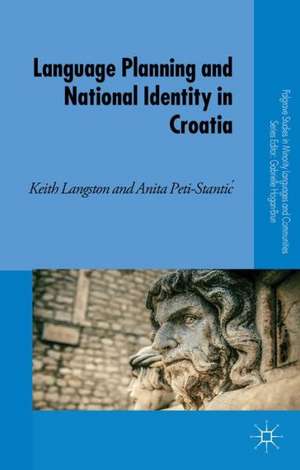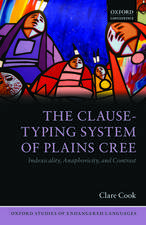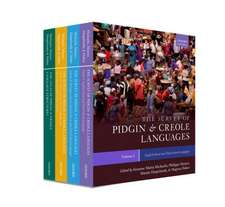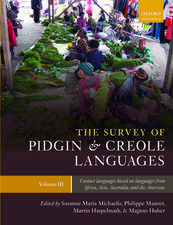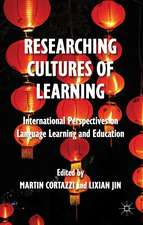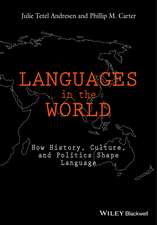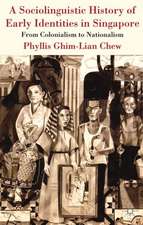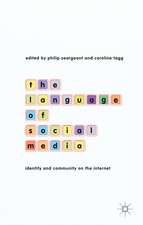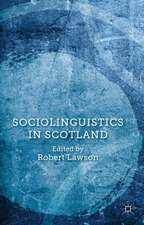Language Planning and National Identity in Croatia: Palgrave Studies in Minority Languages and Communities
Autor K. Langston, A. Peti-Stanticen Limba Engleză Hardback – 19 sep 2014
| Toate formatele și edițiile | Preț | Express |
|---|---|---|
| Paperback (1) | 642.03 lei 43-57 zile | |
| Palgrave Macmillan UK – 2014 | 642.03 lei 43-57 zile | |
| Hardback (1) | 647.40 lei 43-57 zile | |
| Palgrave Macmillan UK – 19 sep 2014 | 647.40 lei 43-57 zile |
Din seria Palgrave Studies in Minority Languages and Communities
- 20%
 Preț: 569.78 lei
Preț: 569.78 lei - 15%
 Preț: 639.25 lei
Preț: 639.25 lei - 18%
 Preț: 942.94 lei
Preț: 942.94 lei - 18%
 Preț: 942.63 lei
Preț: 942.63 lei - 15%
 Preț: 586.70 lei
Preț: 586.70 lei -
 Preț: 385.84 lei
Preț: 385.84 lei -
 Preț: 388.72 lei
Preț: 388.72 lei - 18%
 Preț: 787.91 lei
Preț: 787.91 lei -
 Preț: 392.60 lei
Preț: 392.60 lei - 15%
 Preț: 641.38 lei
Preț: 641.38 lei - 15%
 Preț: 639.90 lei
Preț: 639.90 lei - 18%
 Preț: 790.46 lei
Preț: 790.46 lei -
 Preț: 389.70 lei
Preț: 389.70 lei - 15%
 Preț: 640.88 lei
Preț: 640.88 lei - 15%
 Preț: 641.85 lei
Preț: 641.85 lei - 18%
 Preț: 946.24 lei
Preț: 946.24 lei - 15%
 Preț: 639.41 lei
Preț: 639.41 lei -
 Preț: 386.99 lei
Preț: 386.99 lei -
 Preț: 389.11 lei
Preț: 389.11 lei -
 Preț: 390.63 lei
Preț: 390.63 lei -
 Preț: 392.60 lei
Preț: 392.60 lei -
 Preț: 380.45 lei
Preț: 380.45 lei - 15%
 Preț: 640.55 lei
Preț: 640.55 lei - 15%
 Preț: 644.63 lei
Preț: 644.63 lei -
 Preț: 389.11 lei
Preț: 389.11 lei - 15%
 Preț: 643.34 lei
Preț: 643.34 lei - 15%
 Preț: 589.14 lei
Preț: 589.14 lei - 18%
 Preț: 1010.79 lei
Preț: 1010.79 lei -
 Preț: 390.63 lei
Preț: 390.63 lei - 18%
 Preț: 729.36 lei
Preț: 729.36 lei - 15%
 Preț: 645.79 lei
Preț: 645.79 lei
Preț: 647.40 lei
Preț vechi: 761.65 lei
-15% Nou
Puncte Express: 971
Preț estimativ în valută:
123.88€ • 129.69$ • 102.50£
123.88€ • 129.69$ • 102.50£
Carte tipărită la comandă
Livrare economică 07-21 aprilie
Preluare comenzi: 021 569.72.76
Specificații
ISBN-13: 9781137390592
ISBN-10: 113739059X
Pagini: 344
Ilustrații: XVI, 344 p.
Dimensiuni: 140 x 216 x 28 mm
Greutate: 0.61 kg
Ediția:2014
Editura: Palgrave Macmillan UK
Colecția Palgrave Macmillan
Seria Palgrave Studies in Minority Languages and Communities
Locul publicării:London, United Kingdom
ISBN-10: 113739059X
Pagini: 344
Ilustrații: XVI, 344 p.
Dimensiuni: 140 x 216 x 28 mm
Greutate: 0.61 kg
Ediția:2014
Editura: Palgrave Macmillan UK
Colecția Palgrave Macmillan
Seria Palgrave Studies in Minority Languages and Communities
Locul publicării:London, United Kingdom
Cuprins
PART I: THE CROATIAN LANGUAGE QUESTION IN CONTEXT 1. The Croatian Language Question and Croatian Identity 2. Language and Identity: Theoretical and Conceptual Framework 3. Language, Dialect, or Variant? The Status of Croatian and its Place in the South Slavic Dialect Continuum 4. The History of Croatian and Serbian Standardization PART II: CROATIAN LANGUAGE POLICY AND PLANNING IN THE 1990s AND BEYOND 5. Language Rights and the Treatment of Croatian on the International Level 6. Croatian Language Policy at the National Level and the Regulation of Public Language 7. Institutions of Language Planning 8. Language Purism, Handbooks, and Differential Dictionaries 9. Models of Linguistic Perfection: The Role of the Educational System in Croatian Language Planning 10. The Media and the Message: The Promotion and Implementation of Language Planning in Print, Broadcasts, and on the Internet 11. The Croatian Language Question Today on the Boundary of Identity and Ideology ?
Recenzii
“The book would prove useful for linguistic scholars,particularly those focused on Slavic languages, as it provides a plethora ofexamples detailing the minutia of linguistic variation, both between Croatianand other former Yugoslav languages (particularly Serbian), as well as betweendifferent nationally-recognized, or sanctioned, versions of Croatian throughoutvaried time periods, or as produced by different scholars. … It adds greatly tothe literature on Slavic languages, as well as socio-political scholarship ofthe former Yugoslavia.” (Jacquie L. Greiff, Language Policy, September, 2015)
Notă biografică
Keith Langston is Associate Professor of Slavic Studies and Linguistics at the University of Georgia, USA. He is the author of ?akavian Prosody: The Accentual Patterns of the ?akavian Dialects of Croatian and other studies on Slavic phonology and morphology, in addition to research on the sociolinguistic situation in the former Yugoslavia.
Anita Peti-Stanti? is Professor of South Slavic Languages and the Chair of Slovene Studies at the University of Zagreb, Croatia. She is the author of Language, Ours and/or Theirs: An Essay on the Comparative History of South Slavic Standardization Processes and a Slovenian-Croatian and Croatian-Slovenian Dictionary, as well as studies on South Slavic word order and clitic placement.
Anita Peti-Stanti? is Professor of South Slavic Languages and the Chair of Slovene Studies at the University of Zagreb, Croatia. She is the author of Language, Ours and/or Theirs: An Essay on the Comparative History of South Slavic Standardization Processes and a Slovenian-Croatian and Croatian-Slovenian Dictionary, as well as studies on South Slavic word order and clitic placement.
